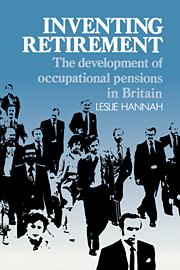Book contents
- Frontmatter
- Contents
- List of tables and figures
- Preface
- Part I The rise of pensioning
- Part II The shaping of the modern pensions institution
- 6 Accident and design in the evolution of pensions
- 7 Pensions in peril? Security, solvency and vesting
- 8 Designing the benefit structure
- 9 Retirement: age discrimination or the fruits of prosperity?
- Epilogue: Contemporary critics and the future of pensions
- Statistical appendix
- A note on sources
- Notes
- Index
9 - Retirement: age discrimination or the fruits of prosperity?
Published online by Cambridge University Press: 03 May 2010
- Frontmatter
- Contents
- List of tables and figures
- Preface
- Part I The rise of pensioning
- Part II The shaping of the modern pensions institution
- 6 Accident and design in the evolution of pensions
- 7 Pensions in peril? Security, solvency and vesting
- 8 Designing the benefit structure
- 9 Retirement: age discrimination or the fruits of prosperity?
- Epilogue: Contemporary critics and the future of pensions
- Statistical appendix
- A note on sources
- Notes
- Index
Summary
society has really no right to deny any man, or woman, who wishes to continue working the sense of fulfilment and the sense of usefulness that work can give. Compulsory retirement is an inhuman practice …
Arthur Seldon, Pensions in a Free Society (Institute of Economic Affairs, 1957), p. 3The idea of retirement has a long and venerable history; but the twentieth century has fundamentally transformed its nature. Modern retirement practice has a number of distinct characteristics. First, it is a general rite of passage which almost all adult employees can now expect to undergo. Second, it is more likely to be compelled at a fixed chronological age, rather than to be initiated by failing physical or mental powers. And third, the financial status of the retired has greatly improved, so that this form of retreat from the world of work is less commonly seen in negative terms than was once the case. These diverse elements have given rise to a rich variety of interpretations of the reasons for the modern growth of retirement. Radicals on the libertarian right and the socialist left alike have interpreted it as the product of unjustifiable discrimination against the old. Others, by contrast, have seen it as the virtuous consequence of the greater choices provided by increased wealth, greatly augmented by the modern spread of pensioning. This ambivalence in the image of retirement is, moreover, reflected in the mixed trauma and relief of those undergoing the retirement experience.
- Type
- Chapter
- Information
- Inventing RetirementThe Development of Occupational Pensions in Britain, pp. 122 - 137Publisher: Cambridge University PressPrint publication year: 1986



